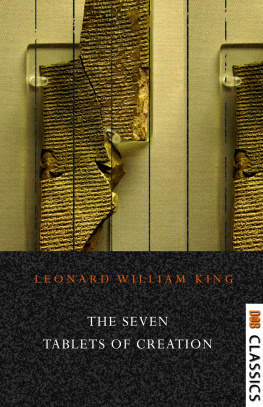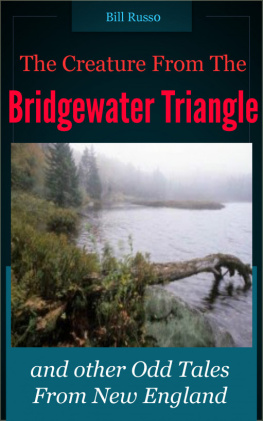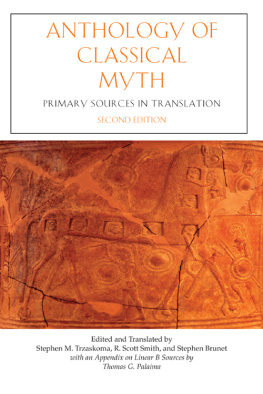THE SEVEN
TABLETS OF CREATION
BY
LEONARD WILLIAM KING
1902
Contents
Preface
PERHAPS no section of Babylonian literature has been more generally studied than the legends which record the Creation of the world. On the publication of the late Mr. George Smith's work, "The Chaldean Account of Genesis," which appeared some twenty-seven years ago, it was recognized that there was in the Babylonian account of the Creation, as it existed in the seventh century before Christ, much which invited comparison with the corresponding narrative in the Book of Genesis. It is true that the Babylonian legends which had been recovered and were first published by him were very fragmentary, and that the exact number and order of the Tablets, or sections, of which they were composed were quite uncertain; and that, although they recorded the creation of the heavens and of the heavenly bodies, they contained no direct account of the creation of man. In spite of this, however, their resemblance to the Hebrew narrative was unmistakable, and in consequence they at once appealed to a far larger circle of students than would otherwise have been the case.
After the appearance of Mr. Smith's work, other scholars produced translations of the fragments which he had published, and the names of Oppert, Schrader, and Sayce will always be associated with those who were the first to devote themselves to the interpretation of the Creation Legends. Moreover, new fragments of the legends have from time to time been acquired by the Trustees of the British Museum, and of these the most important is the fine text of the Fourth Tablet of the Creation Series, containing the account of the fight between the god Marduk and the dragon Tiamat, which was published in 1887 by Dr. Wallis Budge, and translated by Professor Sayce in the same year. Professor Sayce's translation of the Creation Legends marked a distinct advance upon those of his predecessors, and it was the most complete, inasmuch as he was enabled to make use of the new tablet which restored so much of the central portion of the story. In the year 1890, in his important work Die Kosmologie der Babylonier, Professor Jensen of Marburg gave a translation of the legends together with a transliteration and commentary; in 1895 Professor Zimmern of Leipzig translated all the fragments then known, and a year later Professor Delitzsch of Berlin also published a rendering. Finally, two years ago, Professor Jensen issued a new and revised translation of the Creation Legends in the opening pages of the first part of his work Mythen and Epen, the second part of which, containing his notes and commentary, appeared some months ago.
In the course of the year 1900, the writer was entrusted with the task of copying the texts of a number of Babylonian and Assyrian legends for publication in the series of Cuneiform Texts from Babylonian Tablets, etc., in the British Museum, and, among the documents selected for issue, were those relating to the Creation of the world. Several of the texts of the Creation Legends, which had been used by previous translators, had never been published, and one tablet, which Mr. George Smith had consulted in 1876, had not been identified by subsequent workers. During my work I was so fortunate as to recognize this tablet, and was enabled to make copies of all the texts, not only of those which were previously known, but also of a number of new duplicates and fragments which I had meanwhile identified. These copies appeared in Cuneiform Texts, Part XIII (1901), Plates 1-41. The most interesting of the new fragments there published was a tablet which restored a missing portion of the text of the Second Tablet of the Creation Series, and of this, on account of its interest, I gave a translation in a note to the plate on which the text appeared. It was not my intention at that time to publish anything further upon the subject of the Creation Legends.
While I was engaged, however, in searching for fragments of other Babylonian legends for publication officially, it was my good fortune to come across a fine duplicate of the Second Tablet of the Creation. Series. A further prolonged search was rewarded by the finding of other fragments of the poem, and a study of these showed me that the earlier portions of the text of the Creation Story, as already known, could be considerably augmented. Among them, moreover, was a fragment of the poem which refers to the Creation of Man; this fragment is extremely important, for in addition to its valuable contents it also settles the disputed question as to the number of Tablets, or sections, of which the Creation Series was composed. In view of the additional information as to the form and contents of the poem which this new material afforded, it was clearly necessary that a new translation of the Creation Legends should be made, and this I undertook forthwith.
The new fragments of the poem which I had identified up to the summer of last year are inscribed upon tablets of the Neo-Babylonian period. At the conclusion of the examination of tablets of this class, I lithographed the newly identified texts in a series of plates which are published in the second volume of the present work. These plates were already printed off, when, at the beginning of the present year, after my return from Assyria, I identified a fresh group of fragments of the poem inscribed, not upon Neo-Babylonian, but upon Assyrian tablets. At that time I was engaged on making a detailed catalogue, or hand-list, of the smaller fragments in the various collections of Assyrian tablets from Kuyunjik, and, as a result of previous study of the legends themselves and of the Assyrian commentaries to the Seventh Tablet of the series, I was enabled to identify ten new fragments of the poem which are inscribed upon tablets from the library of Ashur-bani-pal at Nineveh. In order to avoid upsetting the arrangement of the plates in Vol. II, the texts of the new Assyrian fragments are published by means of outline blocks in Appendices I and II to the present volume.
Those who have studied the published texts of the Creation Series will remember that the material used by previous translators of the legends has consisted of some twenty-one tablets and fragments inscribed with portions of the poem. The number of new tablets and fragments belonging to the Creation Series which are here used and translated for the first time reaches the total of thirty-four, but, as I have joined up six of these to other similar fragments, this total has been reduced to twenty-eight. Thus, in place of the twenty-one tablets previously known, forty-nine separate tablets and fragments have now been identified as containing portions of the text of the Creation Series.
The new information, furnished by the recently discovered material regarding the Story of Creation, may here be briefly summarized. Hitherto our knowledge of the contents of Tablets I and II of the series has been very fragmentary. After the narrative of the creation of the great gods in the opening lines of the poem, and a fragmentary reference to the first symptoms of revolt exhibited by the primeval monsters, Aps and Tiamat, and Mummu, the minister of Aps, there occurred a great gap in the text, and the story began again with the account of how Tiamat prepared to wage war against the gods. Aps and Mummu have at this point entirely disappeared from the narrative, and the ally of Tiamat is the god Kingu, whom she appoints to command her forces. What followed the creation of the great gods, what was the cause of the revolt, what was the fate of Aps and Mummu, and what were the events which led up to Tiamat's preparations for battle, are questions that have hitherto remained unanswered. We now know that the account of the creation of the gods was no fuller than that which has come down to us from Damascius. After the birth of Lakhmu and Lakhamu, Anshar and Kishar, Anu, Bl (i.e., Enlil, or Illil), and Ea (Nudimmud), the text does not proceed to narrate in detail the coming forth of the lesser deities, but plunges at once into the story of the revolt of the primeval forces of chaos. We now know also that it was Aps, and not Tiamat, who began the revolt against the gods; and that, according to the poem, his enmity was aroused, not by the creation of light as has been previously suggested, but by the disturbance of his rest in consequence of the new "way" of the gods, which tended to produce order in place of chaos.
Next page









